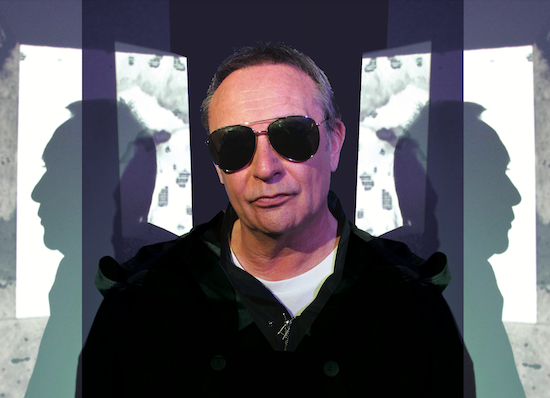When I first heard that Stephen Mallinder had chosen a list of sci-fi soundtracks for his Baker’s Dozen, it was like that moment in The Blues Brothers when the light of revelation shines down on John Belushi’s character, Jake. As a founding member of the legendary DIY electronic and industrial pioneers Cabaret Voltaire, through his work as Sassi & Loco, the Ku-Ling Bros, Hey, Rube!, and in more recent years with the excellent Wrangler and Creep Show, such a choice could hardly be more apt.
Add to that, his work on Peter Care’s cult classic Johnny YesNo, the creation of the UK’s first independent video label Doublevision and his role as an academic and lecturer on the Digital Music & Sound Arts course at Brighton University, and it becomes obvious that this is a selection that was ‘written in the stars’.
Cabaret Voltaire’s earliest recordings, such as those documented on the Industrial Records cassette 1974-1976, offer a fascinating glimpse of a band experimenting with DIY electronic devices in an effort to make “music without musical instruments”, anticipating a future perhaps only previously seen in dystopian science-fiction.
According to Mallinder: “One of the great touchstones for me, Richard and Chris in the early days, coming from when we were kids was The Outer Limits. More than Dr Who, which was all very lovely and home counties for us and as much as the Radiophonic Workshop were brilliant, I have fonder memories from earlier stuff like Outer Limits. We couldn’t afford much and this was before we had released anything, so the early 70s we pushed the boat out and had some promo stickers made, which said: ‘Cabaret Voltaire – The Outer Limits’. So, it was always in there really. That idea of the sounds of the future, the sounds of weirdness as well. I might be giving the game away a bit but I think everybody knows about it now. The famous sample [from ‘Yashar’]: “The 70 billion people of Earth, where are they hiding?” is from the episode ‘Demon With A Glass Hand’, written by Harlan Ellison.”
Another reason, Mallinder tells me, that soundtracks are important to him is because they are non-vocal, not song based. The same goes for club music, because it’s not driven by radio play, short singles and so forth. “Soundtracks, like electronic club music, are a form that opens up and there’s room to move within that. It’s always appealing. The stabilisers are off and you can do what you want within those genres.” Talking more specifically of his 13 choices, Mallinder adds: “In some ways, with this selection it’s hard to separate the soundtrack from the film. In some ways, it’s the film that carries it and the soundtrack brings embellishments.”
When speaking of the usual disappointment that inevitably follows viewing the majority of modern science-fiction films (with the exception of Dune, Arrival and Under The Skin), Mallinder again gets right to the heart of the issue. “I think there’s a rationale for that and that is the present day is weirder than any future you could imagine, so it is often going to be a letdown. Our ideas of science-fiction and the future still manifest themselves as our past ideas of what the future would be like. I think we’re inevitably disappointed because we’re living in some kind of ersatz version of what we thought the future was going to be.”
This doesn’t mean, however, that Stephen Mallinder is one to rest on his laurels. His next release is a solo album, “a collection of pieces of music that reflect working in isolation”, Tick Tick Tick and a new Creep Show album is already in the works.
Tick Tick Tick is released by Dais on Friday. To read Mal’s Baker’s Dozen, click on the image below.


